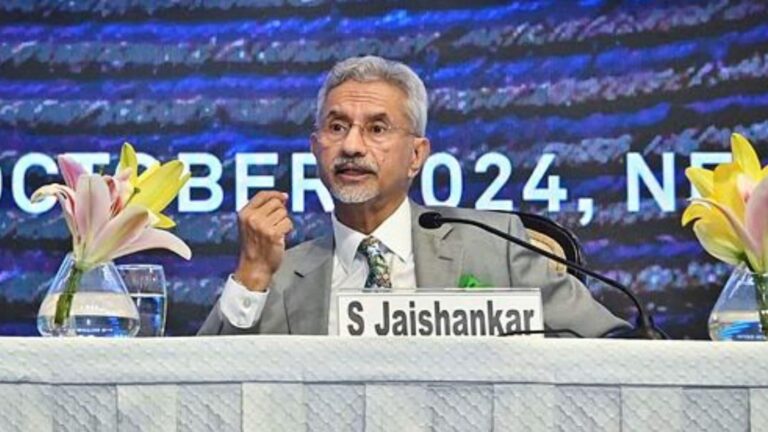In a pointed address reflecting growing global trade tensions, India’s External Affairs Minister S. Jaishankar underscored the country’s unwavering commitment to maintaining its freedom of choice in international economic partnerships. Taking a veiled swipe at both the United States and China, Jaishankar criticized what he termed “trade hypocrisy,” signaling India’s intent to navigate the complex geopolitical landscape on its own terms. His remarks, delivered amid escalating protectionist tendencies worldwide, highlight New Delhi’s strategic balancing act as it seeks to safeguard its economic sovereignty while engaging with major global powers.
Bharat Asserts Sovereignty in Trade Decisions Amid Global Pressure
External pressures from global superpowers have sharpened India’s resolve to uphold its independent trade policies. In a candid address, External Affairs Minister S. Jaishankar emphasized that Bharat will not bow to coercion from either the US or China, asserting its unwavering commitment to sovereign decision-making in economic affairs. He condemned what he termed as “trade hypocrisy,” highlighting inconsistent practices by major powers who demand market access from India while restricting entry to their own markets.
The minister also outlined India’s strategic priorities amid geopolitical tensions, signaling a balanced approach to international commerce that wards off undue influence. Highlighting key areas of focus, Jaishankar pointed out that India’s trade policies will remain rooted in national interests, with no compromise on:
- Economic self-reliance without sacrificing global engagement
- Fair trade practices devoid of double standards
- Protection of domestic industries to foster sustainable growth
| Country | Trade Approach | India’s Response |
|---|---|---|
| United States | Demand for market access with tariffs | Maintaining reciprocal trade balance |
| China | Selective economic engagement | Promoting indigenous production |
| Global | Unequal trade norms | Advocating fair and transparent rules |
Jaishankar Critiques Double Standards in US and China Trade Policies
External Affairs Minister S. Jaishankar took a firm stand against the inconsistent trade approaches of the United States and China during recent addresses. Highlighting what he termed as “trade hypocrisy,” Jaishankar emphasized that both nations often apply different rules to themselves and others, creating an uneven global economic playing field. He underscored that India refuses to be coerced by external pressures to pick sides, reinforcing the country’s commitment to strategic autonomy and economic sovereignty. The minister pointed out that such double standards hamper genuine trade partnerships and threaten the fundamentals of fair commerce worldwide.
- Criticism of protectionist policies masked as national security concerns
- Advocacy for transparent, rules-based trade mechanisms
- Call for respect toward developing nations’ sovereign decisions
Jaishankar also noted India’s evolving role as a key player in the global market, leveraging its position to negotiate trade deals that reflect its interests and values. Stressing the importance of freedom of choice, he reiterated that India will continue to foster relationships that align with its goals rather than succumb to unilateral pressures. This stance signals a shift in international diplomacy, where emerging economies demand equitable treatment and resist being pawns in great power rivalries.
| Country | Trade Policy Approach | India’s Response |
|---|---|---|
| United States | Selective sanctions & tariff impositions | Calls out protectionism, demands fairness |
| China | Market access restrictions and preferential treatment | Asserts sovereign freedom, resists coercion |
| India | Strategic autonomy with open economic engagement | Balances interests; prioritizes freedom of choice |
Experts Recommend Strengthening Domestic Industries to Safeguard Economic Independence
In light of increasing geopolitical tensions and global trade uncertainties, economic experts are urging India to double down on its efforts to fortify indigenous industries. Strengthening domestic manufacturing and innovation is seen not only as a shield against external economic pressures but also as a catalyst for sustainable growth. This approach aligns with the vision of maintaining the country’s autonomy in decision-making, ensuring that dependency on foreign powers remains minimal. Experts highlight that a resilient domestic industrial base will enable India to navigate complex international trade dynamics without compromising its strategic interests.
Key recommendations from industry leaders include:
- Enhanced investment in research and development to boost technological self-reliance
- Robust policies fostering small and medium enterprises (SMEs) as innovation hubs
- Streamlining supply chains domestically to reduce vulnerabilities
- Incentivizing sustainable and green manufacturing practices
| Sector | Proposed Action | Expected Impact | ||||||||||||
|---|---|---|---|---|---|---|---|---|---|---|---|---|---|---|
| Electronics | Boost local chip production | Reduce import dependency by 40% | ||||||||||||
| Textiles | Upgrade technology & skill training | Enhance export competitiveness | ||||||||||||
| Pharmaceuticals | Expand active ingredient manufacturing | Strengthen healthcare supply chains It looks like your table’s last row is incomplete. Here’s the completed version of the last row and the entire table, properly formatted for your section:
If you want me to help with anything else like improving the content, adding more sectors, or styling tips, just let me know! Closing RemarksAs India navigates an increasingly complex global landscape, External Affairs Minister S. Jaishankar’s remarks underscore the country’s commitment to safeguarding its strategic autonomy and freedom of choice. His pointed critique of both the United States and China reflects New Delhi’s insistence on a balanced foreign policy that prioritizes national interests over external pressures. As India continues to assert itself on the world stage, this stance signals a resolute approach toward trade partnerships and diplomatic engagements, reaffirming its position as a sovereign actor in global affairs. |




